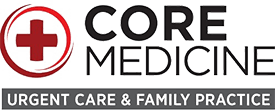 Diarrhea is a common and often uncomfortable condition that affects individuals of all ages. Whether it's a brief bout of loose stools or a persistent, disruptive issue, diarrhea condition can be a frustrating and, at times, concerning experience. As healthcare providers at Core Medicine of Idaho, we understand the importance of addressing this prevalent gastrointestinal concern and providing our patients with the knowledge and resources to manage it effectively. In this blog post, we'll delve into the underlying causes of diarrhea, explore various treatment options, and discuss the crucial signs that indicate the need for medical attention.
Diarrhea is a common and often uncomfortable condition that affects individuals of all ages. Whether it's a brief bout of loose stools or a persistent, disruptive issue, diarrhea condition can be a frustrating and, at times, concerning experience. As healthcare providers at Core Medicine of Idaho, we understand the importance of addressing this prevalent gastrointestinal concern and providing our patients with the knowledge and resources to manage it effectively. In this blog post, we'll delve into the underlying causes of diarrhea, explore various treatment options, and discuss the crucial signs that indicate the need for medical attention.
Understanding the Causes of Diarrhea
Diarrhea can be triggered by a wide range of factors, from dietary indiscretions and food poisoning to chronic medical conditions and medication side effects. Some of the most common causes of diarrhea include:
- Viral infections, such as the stomach flu or norovirus
- Bacterial infections, including salmonella, E. coli, and Clostridium difficile
- Food allergies or intolerances, particularly to lactose or gluten
- Inflammatory bowel diseases like Crohn's disease or ulcerative colitis
- Irritable bowel syndrome (IBS)
- Certain medications, including antibiotics, laxatives, and antidepressants
Identifying the root cause of your diarrhea is crucial, as it will inform the most appropriate treatment approach. If the symptoms persist or worsen, it's essential to seek medical attention to rule out any underlying health concerns.
Managing Diarrhea
Strategies for Relief and Recovery In many cases, diarrhea can be managed with simple, at-home remedies. Here are some effective strategies to consider:
- Stay hydrated by drinking plenty of water, broth, or electrolyte-rich beverages to replace the fluids and electrolytes lost through diarrhea.
- Consume a bland, easy-to-digest diet, such as the BRAT (Bananas, Rice, Applesauce, Toast) diet, to help soothe the digestive system.
- Avoid caffeine, alcohol, dairy products, and high-fiber foods, as these can exacerbate diarrhea.
- Over-the-counter medications like antidiarrheals (e.g., Imodium) or anti-nausea medications can provide temporary relief, but it's essential to use them as directed.
If the diarrhea persists for more than 2 days or is accompanied by severe symptoms, it's crucial to visit a Caldwell urgent care or family medicine provider. Prolonged or severe diarrhea can lead to dehydration, electrolyte imbalances, and other potentially serious complications that require professional intervention.
When to Make an Appointment at Our Caldwell Family Medicine Practice
While most cases of diarrhea can be managed at home, there are certain situations where seeking medical care is essential. You should consider contacting our Caldwell urgent care clinic if you experience:
- Diarrhea that lasts more than 2 days
- Severe abdominal pain or cramps
- Blood or mucus in the stool Fever higher than 101°F (38.3°C)
- Signs of dehydration, such as excessive thirst, dry mouth, or dizziness
- Diarrhea in infants or young children, as they are more susceptible to dehydration
Our office can perform a thorough evaluation, order necessary tests, and provide appropriate treatment to address the underlying cause of your diarrhea and prevent potential complications. Remember, diarrhea is a common condition, but it shouldn't be ignored. By understanding the causes, implementing self-care strategies, and seeking medical attention when necessary, you can take control of your gastrointestinal health and find the relief you deserve.
